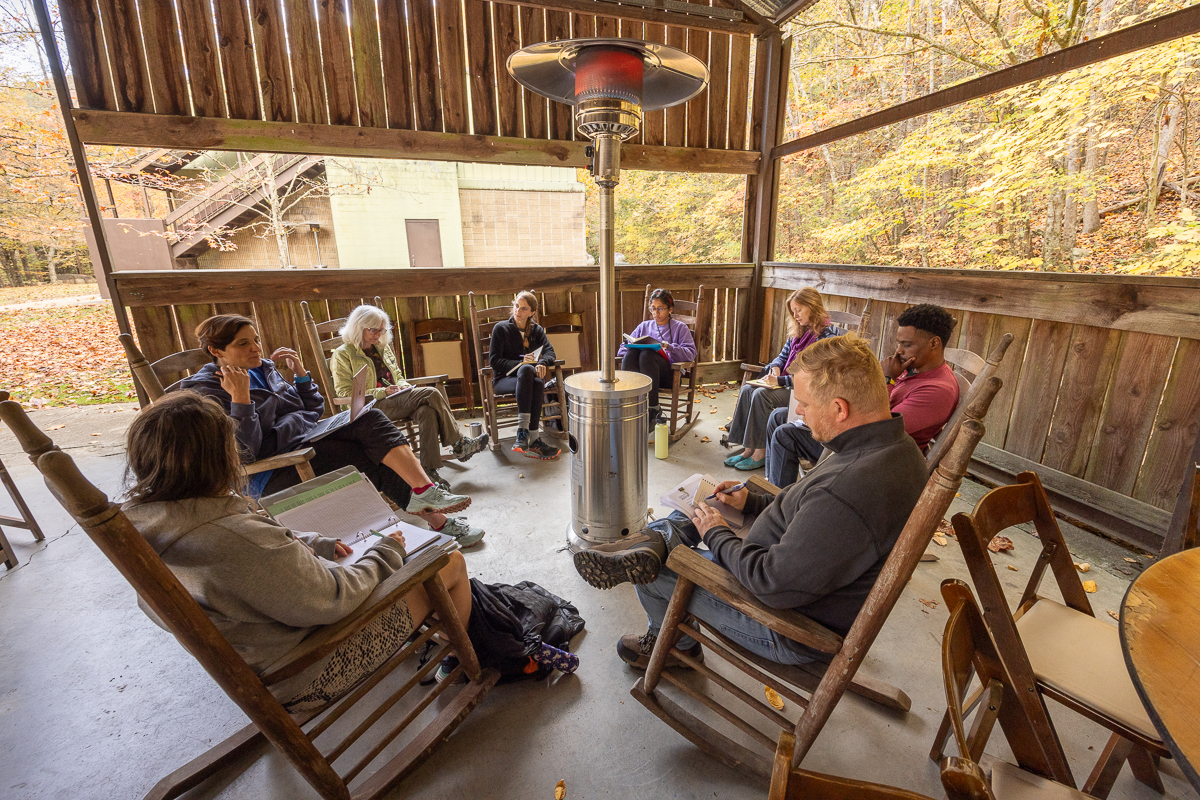
Walker Valley near Townsend, Tennessee, is one of the most strikingly beautiful havens of biodiversity in Great Smoky Mountains National Park. Nestled here just beside the Middle Prong of the Little River and not far from the impressive Spruce Flats Falls, Great Smoky Mountains Institute at Tremont has been connecting people to nature for more than 50 years—and many of those people have been writers.

“Writing and literature, broadly speaking, are nothing new to Tremont,” says Jeremy Lloyd, the institute’s manager of field programs and collegiate studies. “One can trace the literary arts back to our earliest beginnings when students wrote poetry each day in their outdoor ‘sit spots.’ One also pictures the allure of our wild setting inspiring people to set pen to paper long before Tremont existed as an outdoor school and education center.”
It’s fitting, then, that last autumn, as colorful leaves were swirling down from the tall trees in Walker Valley, the Tremont institute held its very first writers conference in partnership with Smokies Life. The chance to embark on this immersive retreat into the wilderness drew more than a hundred applicants from all over the country. Twenty writers were selected to spend five days tucked away deep in the Smokies while being housed, fed, coached, and led by Tremont staff and author workshop leaders.
“We look forward to doing it all over again later this year when we’ll welcome back Frank X Walker as our guest author as well as workshop leaders Maurice Manning in poetry, Monic Ductan in fiction, and David Brill in nonfiction,” says Lloyd, who is the co-coordinator of the conference along with this author. The conference is now accepting applications.

This year’s leader of the fiction cohort, Monic Ductan, was born and raised in Georgia and now lives in Cookeville, Tennessee, where she teaches literature and creative writing at Tennessee Technological University. Her story collection Daughters of Muscadine (2023) focuses on a group of working-class Black women and families in rural Georgia. She is currently working on a novel about a 911 dispatcher who uncovers corruption in her small-town police department when her police officer boyfriend shoots an unarmed Black man.
“I feel that I get more writing done when I’m surrounded by people who are excited about their own work,” Ductan says. “I belong to an online writers’ group right now, and they are all holding me accountable by expecting pages from me each month. I think working with writers at Tremont will provide that same inspiration. Reading what others are writing will inspire me to work harder to finish this novel of mine.”
Ductan won the 2019 Denny C. Plattner Award for her essay Fantasy Worlds and the 2021 Love Merit Prize in the annual Stories That Need to Be Told contest from Tulip Tree Publishing. Her writing has appeared in numerous publications and will be included in the forthcoming anthology Troublesome Rising: A Thousand-Year Flood in Eastern Kentucky.
“I’m always excited to read the works for the workshop, but most importantly I look forward to the conversations,” she says. “I always learn a lot from hearing other authors talk about writing.”

Leading this year’s poetry cohort, Maurice Manning teaches at Transylvania University in Lexington, Kentucky, and for the Warren Wilson College MFA Program in Swannanoa, North Carolina. He is currently working on what he calls a “batch” of poems set in rural Kentucky borrowing themes from the biblical psalms.
“My content tends to be recurrent—hills and trees, shadows and distance,” he says. “The real labor is connected to form: how to express the content in new ways, how that expression can sound and feel, and how all of it can be arranged to surprise or resonate. At the Tremont conference I’ll be sure to ask participants in my workshop to consider the relation in their work between content and form.”
Manning has published eight collections of poetry, the most recent being Snakedoctor (2023). His fourth book, The Common Man (2010), was a finalist for the Pulitzer Prize, and his poems have been published in The New Yorker and Time. He and producer Steve Cody have also published ten episodes of The Grinnin’ Possum Podcast, featuring original poetry, old-time music, and history.
“I’m drawn to the connection this conference makes between nature and art,” he says. “It is a connection I’ve tried to make in my poetry, a vital one I believe. I’m also attracted to the Tremont approach to hands-on learning. Being in a natural setting will allow participants to absorb visceral detail and knowledge—landscape, geology, trees and plants, animals and birds, waterways, the heavens and stars. In poetry, things of nature are both facts and symbols. All knowledge begins in nature, from observation and study.”

Tremont is probably best known for the way it weaves natural history and science into its programming. So, the conference capitalizes on that strength, offering afternoon hikes and other outdoor activities during which certified naturalist guides introduce the visiting writers to the fascinating flora and fauna of the Smokies.
At last year’s conference, working in tandem with the author workshop leaders over the five days was guest author Richard Powers, who came to the Smokies seven years ago for a what he wittily called a “three-hour tour” to do research for his Pulitzer Prize-winning novel, The Overstory, and decided to stay. On Saturday afternoon, when the group had reached the crescendo of their conference bond—all shyness and trepidation having been swept aside like falling leaves—Powers gave a Craft Talk during which he attempted to synthesize and download for the group everything he had learned about creating works of writing over the past four decades. It was a masterful and interactive lecture, probably not unlike many he gave at Stanford or the University of Illinois during his illustrious career as a teacher of literature.
One of last year’s author workshop leaders, Frank X Walker, is the first African American to be named Kentucky Poet Laureate. He will be joining us this year in the avuncular role that Powers occupied during the inaugural conference. Frank is talented at applying the general principles of poetic writing to fiction and nonfiction forms. He and Smokies Life author David Brill will be featured in an upcoming companion column about the Tremont Writers Conference.
Bill Griffin, author of Snake Den Ridge: A Bestiary, wrote of last year’s event: “I’d never attended a writer’s conference, and after this I’ll never attend another because once you’ve experienced perfection, you’re full. Thanks for filling us all to overflowing!”
Applications to the October 23–27, 2024, Tremont Writers Conference are being accepted now through April 30. See faculty bios, view the full schedule of activities, read detailed guidelines, and apply today at writers.gsmit.org.
Subscribe to get the latest posts sent to your email.
The Great Smokies Welcome Center is located on U.S. 321 in Townsend, TN, 2 miles from the west entrance to Great Smoky Mountains National Park. Visitors can get information about things to see and do in and around the national park and shop from a wide selection of books, gifts, and other Smokies merchandise. Daily, weekly, and annual parking tags for the national park are also available.